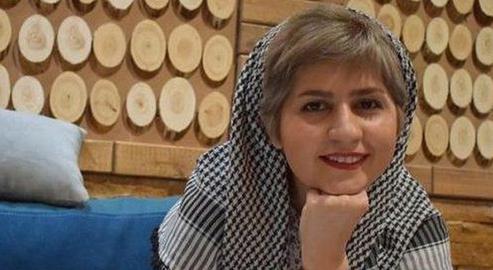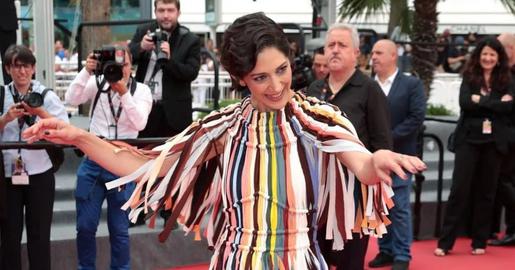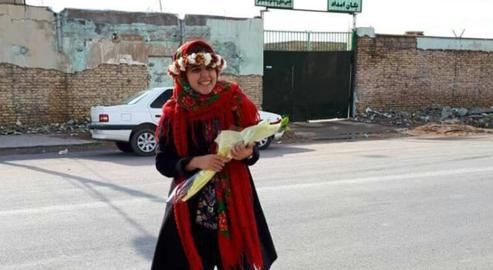Sepideh Gholian is a 25-year-old civil rights activist and journalist who was arrested during the labor protests of Haft Tappeh workers and sentenced to 18 years in prison. Her book, Tilapia Sucks the Blood of Hur al-Azim, tells the story of her detention at the Dezful Intelligence Detention Center and Sepidar Women's Prison in Ahvaz.
In these 19 stories, Gholian paints a meticulous picture of her horrific experience. On one hand, we directly encounter the face of oppression. On the other, we engage with the fates of others whose names, lives and imprisonment might otherwise be doomed to be forgotten and denied.
IranWire has previously published Gholian’s book in its original Persian and is now serialising the collection in English, while its author has been returned to Iran’s notorious Evin Prison. The stories are translated by Zahra Moravvej.
The first story of Sepidar Women’s Prison:
They inspect me. I am naked. Gholami, the duty officer, claims that since I have been in solitary confinement for two months there is somehow a risk that I might smuggle drugs or bugging devices into the prison. She keeps touching my breasts and between my legs, asking: “What were you doing at Haft Tappeh? Why have they arrested you?”
“Ma’am, I am very tired, I can’t. I’m not clean, as you can see. I’m embarrassed. Please, do what you must do, faster.”
Gholami has large breasts and a black mole on her chin. Long ago, I used to imagine these were the features of kind people. She tells me, “Go to Mrs. Naderi.”
Mrs. Naderi is the head of security. I have heard her name before being transferred here. At Ahvaz intelligence detention centre, a man told me: “When you arrive at the prison, first go to Mrs. Naderi.”
I won’t lie, before going to Sepidar I had heard a lot about the place. I heard that all the prisoners there were dangerous criminals so I was horrified about being sent there.
I go to Naderi and tell her the intelligence department had told me to come to her.
She says, “Oh yes, dear Sepideh! Please go to the prison clinic. We need to check you are a virgin."
Resistance is useless. I am worn-down and defenseless in prison. The doctor’s assistant with a dark gray scarf and white uniforms suddenly tugs on my hand: “Stop playing innocent!”
I lay down on the bed. She curses and swears and opens my legs forcefully. Mrs. Naderi snidely says, “I’ll await the result!”
I keep telling them that I am not clean, I feel embarrassed.
"Even in this condition, you have done it! Stop playing innocent!”
I feel as if I have been smashed with a thousand batons. I run into the corridor barefoot and get into the women's ward.
I look around. A girl approaches me: “Wow! Look at her hair!" And there, suddenly, I see Zahra Hosseini. We scream with delight and everyone crowds around us.
She hands me a candy: “Eat, eat! I know how you feel.”
At the same time, a woman in white platform shoes and a yellow skirt passes me and instantly distorts my perception of the prison. I ask her, “Zahra! Who is this?"
“Somayeh. She murdered someone.”
“She must have been a cold-blooded killer,” observes one of Zahra’s friends. “How else could you murder someone and be so cool?”
If Somayeh dressed differently, she wouldn’t come across like a cold-blooded killer at all. Her cellmates, at least, knew her as a good, reasonable 30-year-old woman. This seemingly cruel, yellow-skirted murderer is a handicraft artist and I buy some of her creations for Tahora, Mehra and Nahal. Somayeh has thick eyebrows and a downy mustache, a round face, straight teeth, and a nice laugh. Zahra and I try to be her friend.
Somayeh is a jack of all trades. She is the head of the ward, who makes artifacts out of leather, knits, makes ornaments is responsible for sugar and coffee in the workshop. She wears colorful dresses and loves to dance. She is charged with homicide and has to collect nearly 15 billion tomans to pay the blood money. She talks eagerly and has interesting stories to tell. Sometimes she is a five-year-old child, and sometimes she is an 80-year-old woman. She knows the shortcuts. That’s why she’s the only person in prison with platform shoes.
Platform shoes are banned, but Somayeh knows how to get around the strict and tough-going inspections. She is also aware of how and when to wear those shoes away from the guards.
She is close to the guards. And yet, she is tough and firm against them. Although she adores life and tries to survive by living it full of colors, she stayed under her blankets on Iranian new year. Later she told me, “Mostafa, Samaneh, my mother and I celebrated the new year under the blanket.”
She tries to collect the 15 billion tomans that she is assured will be impossible, and yet she still works hard for, for Mostafa and Samaneh. Somayeh narrates everything romantically. On Mondays at two o'clock she goes to the security office of Mrs. Naderi to view her photos, which are not allowed on the ward. She looks at them with longing, and then returns.
She tells Mrs. Naderi that these are her uncles’ pictures. Everybody knows that she is lying, but she cries so honestly that she fools even Naderi.
Somayeh has a lot of uncles, she knows how to fall in love, and she revels in each love differently. She has gone through a lot, and brought a bluefish onto the ward. Its name is Sepideh. That is her code for being a romantic soul, and has nothing to do with me. We get closer; in the meeting salon, she brings me a sandwich. She makes lipstick with Vaseline. We enter different phone numbers on the newly filled-out cards, because each person can only save up to five numbers.
I see her crying for the first time at new year. We are all laughing together and she is making faces. The song "Mother" by Reza Nickfarjam is playing. I see her tears falling, but her face doesn’t change. She just whispers, ”Shame on me! I never understood how precious you are. I took you for granted. Please forgive me for being so self-absorbed.”
The second time she cries is on visitation day. She tells the guard, “It’s a long time since I had any wool. Please, I’m knitting to earn the blood money. Please let the wool in.”
When the visitors leave, the duty head Mrs. Pirayesh stops her in front of everyone, and admonishes her: “Listen, you filthy murderer! You belong in a graveyard. You can't fucking ask for wool!”
Somayeh screams, and Pirayesh attacks her. The way that she is shouting shakes not just the prison but the whole city. Then she goes on hunger strike for five days and by the end is at death’s door. I go to see her, I hold her, and she faints. She is crying and crying. I give her a bar of chocolate. She takes it, then starts to tell me how it was she turned into a “killer”.
“I am a woman, and I needed a job. I ran a drive-to-school service. The car was not mine but I loved my job. I decided to buy a car of my own to take my sweeties out; I loved taking them to the parks and having fun. It was Yasmina that made me peruse the idea of having a car of my own. She said, ‘Aunt Somayeh, can you please take us out for dinner? My mom said if you accompany us, we can go.’
“I went to Tejaran Bank and asked about the conditions for getting a loan. He said, ‘Write down your request. The manager of the bank will confirm it. Then come back here and I’ll tell you about the additional paperwork.’
“I went to see the manager of the bank. If only I hadn’t done that. The manager and I got into a close relationship. I used to call him ‘Uncle’! Uncle is a man who is rich and powerful – but he changed the rules of the game. The verbal and sexual assaults increased. Later I found out that he was married. But I couldn’t break up with him. He was threatening me constantly.
“We live downtown and he lived uptown. I would be beheaded over the slightest rumor. I knew that many people were talking behind my back already, just because I was a driver. My relationship with the bank manager led to some strange requests. Then he asked me to introduce him to my sister Samaneh!
“I, Somayeh, as a weak female and the party that’s always guilty, had tolerated all kinds of abuse that rich bank manager had imposed on me. But this one was unbearable. I begged him to stop. Instead, he threatened to release our photos, informing my relatives and cashing in on my trust because I was two months behind the loan repayments.
“I was a woman and my hands were tied! It was a power game and I was the loser. I needed to save Samaneh. He gave me a deadline to bring my sister to him. I called him and begged to be alone with him one last time, and I promised that I would take my sister to him the next night.
“There, I made him a milkshake and dropped a pill in it. When he fell unconscious, I put him into the same car that he had loaned me the money to buy.
“His body was in the trunk. I drove to an outlying area. Then I set fire to both him and the car! I knew I would burn with them, but I was happy that I had saved Samaneh. I went home and turned on my laptop and cried over our pictures. Then I went to the police station and confessed to what I’d done.”
Somayeh describes all the details of her arrest. She tells me that once she had to take a shower with a bucket. What she has told me is not a murder story, but the narration of a protest against the repression of an entire gender. She lit a fire in order to flourish. She is the victim of poverty, but struggles tooth and nail to survive, even though she is well aware that it is impossible to win.
Reflection on the murder turns me to a new realization. Somayeh was not the murderer. The murderer is a system that always blames women!
Somayeh struggles right up until the final minutes of her life. Then, a minute comes that separates her wool thread from the knitting needles, and leaves her busy hands lifeless.
If only there were a word to describe her lust for life. Reality slaps us across the face when two female soldiers came to Somayeh and ask her to get up from her bed forever. She is anxious, but asks them for her last wish. She doesn’t ask for forgiveness or another chance or anything like that, but she asks to dance for two minutes.
“Dancing is banned!”
Even for a prisoner that is going to stand still forever? I ask myself. Even for the one who has struggled to stay alive for six long years?”
“How can you be so cruel and resentful?”
Jadori roars, “No! Dancing is banned. Don’t abuse your situation!”
When I return to Sepidar prison in November, I hold the last image I have of Somayeh with me. She was a woman that stood behind the bars in the duty officer’s room and begs Jadori for two minutes’ dancing.
She knew that her life and breath hung by a thread. She knew that she could dance without being afraid of losing call or visitation rights. So why did she ask for permission? Why didn't she just dance without getting permission from anyone? Maybe she wanted to show others how cruel Jadori is.
Maybe she wanted to say, “This is I, Somayeh Shahbazi! The prisoner that has been labeled a scrounger. Yet the head of this place, knowing that I am about to be executed, wouldn’t even let me have a thread.”
The threads, the dance, the guards – and the Somayeh who is hanged on the morning of December 3. Our eyes are an abomination when your lively eyes are closed forever. Our laughter is horrible when the corridors are not filled with the sound of yours.
My dear Somayeh! It is a backbreaking pain that you are not here anymore. How sadly we remain patience. Somayeh Shahbazi, my dear sister, comrade and cellmate, was hanged in Sepidar prison today.
visit the accountability section
In this section of Iran Wire, you can contact the officials and launch your campaign for various problems




















comments